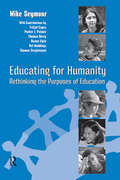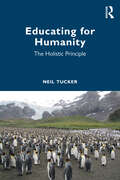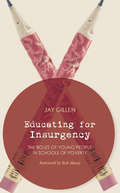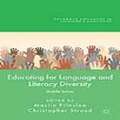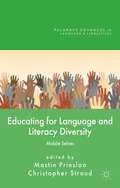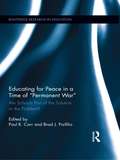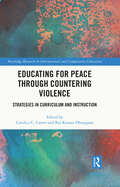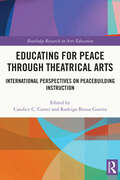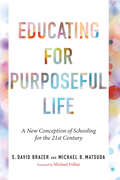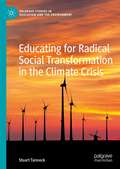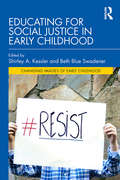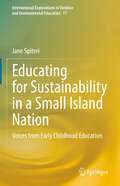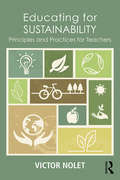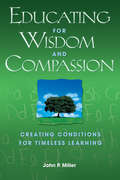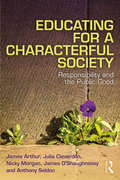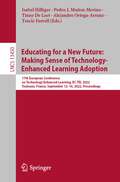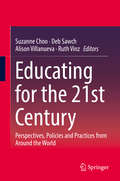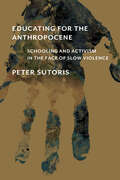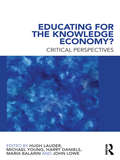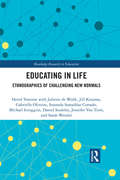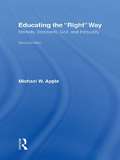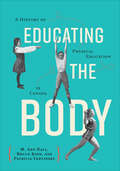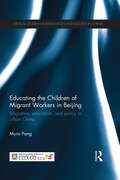- Table View
- List View
Educating for Humanity: Rethinking the Purposes of Education
by Mike Seymour Henry M. LevinAt a time of profound crises around the world, when social justice, peace, democracy and the environment seem under increasing threat, the promise of "a world for all" seems a viable aspiration for education. Ample evidence from many schools today, and dating back throughout the last century, prove that the purpose of educating young people to develop character, compassion, purpose and commitment is integral with the mastery of intellectual skills and life competencies. Schooling, without a doubt, can play a monumental part in the development of the personal values people take with them to the world. Unfortunately, as the saying goes, "if you don't know where you're going, you'll probably get someplace else." Educational policy directions over the last twenty years have veered far away from the important work of educating for humanity. This book makes a powerful appeal to revisit educational purpose in light of what is most fundamental and important to human beings everywhere. The authors address timely issues such as high stakes testing, school choice, and privatization of education in looking beyond these measures to new approaches to educational excellence.
Educating for Humanity: The Holistic Principle
by Neil TuckerThis book explores the international landscape of educational scholarship, policy, and practice. Tucker argues there is a fundamental aim for world education. It is to educate complete human beings in all their dimensions, such that they become the best persons they can be, and participate fully in ‘the human story’.Tucker asks: What is the world of education for? What is it that early childhood centers, schools and local communities are meant to do for children and their learning? Representing a decade of research, the text examines the most common concepts of the purposes of education, human nature and learning offered by scholars, international authorities and pedagogies, nations, education organizations, neuroscience, early childhood educators, and individual schools. To ‘educate for humanity’, Tucker provides a complete concept of holistic education – of whole child and holistic learning for a whole world.The book is an essential resource for those involved in the world of education – teachers, university administrators, school authorities, policy makers, and educational organizations. Parents and community members with a strong interest in the education of all children will also find much that is informative and challenging to think about.
Educating for Insurgency
by Bob Moses Jay GillenA manifesto for today's broken schools.Desegregation has failed. Schools filled with black and brown students have become plantations of social control, where the policing of behavior trumps the expanding of minds. Radical teachers and organizers in American public schools must help young people fashion an insurgency. That means, at the very least, seeing each student's rebellion not as violation, but as communication.Jay Gillen writes with passion and compassion about the daily lives of poor students trapped in institutions that dismiss and degrade them. In the spirit of Paulo Freire, and using the historical models of slave rebellions and Civil Rights struggles as guides, Gillen explains what sort of insurgency is needed and how to create it: the tools and techniques required to build social, intellectual, and political power.This poetic manifesto of revolutionary "educational reform" belongs in the pocket of anyone who currently works in, suffers through, or simply cares about public schooling in this country.Jay Gillen teaches English in a Baltimore public school and has worked with the Baltimore Algebra Project since 1995, building math literacy among youth of color and youth experiencing poverty in US public schools.Bob Moses is an educator and Civil Rights activist. He founded the Algebra Project in 1982.
Educating for Language and Literacy Diversity
by Mastin Prinsloo Christopher StroudEducators and researchers in variety of locations increasingly encounter linguistically and socio-culturally diverse groups of students in their classrooms and lecture halls. This book examines everyday forms of talk and writing in relation to standardised forms and schooling expectations to suggest ways forward in educational discourse.
Educating for Language and Literacy Diversity: Mobile Selves (Palgrave Advances In Language And Linguistics Ser.)
by Mastin Prinsloo Christopher StroudEducators and researchers in variety of locations increasingly encounter linguistically and socio-culturally diverse groups of students in their classrooms and lecture halls. This book examines everyday forms of talk and writing in relation to standardised forms and schooling expectations to suggest ways forward in educational discourse.
Educating for Peace in a Time of Permanent War: Are Schools Part of the Solution or the Problem? (Routledge Research in Education)
by Paul R. Carr Brad J. PorfilioWhat is the meaning of peace, why should we study it, and how should we achieve it? Although there are an increasing number of manuscripts, curricula and initiatives that grapple with some strand of peace education, there is, nonetheless, a dearth of critical, cross-disciplinary, international projects/books that examine peace education in conjunction with war and conflict. Within this volume, the authors contend that war/military conflict/violence are not a nebulous, far-away, mysterious venture; rather, they argue that we are all, collectively, involved in perpetrating and perpetuating militarization/conflict/violence inside and outside of our own social circles. Therefore, education about and against war can be as liberating as it is necessary. If war equates killing, can our schools avoid engaging in the examination of what war is all about? If education is not about peace, then is it about war? Can a society have education that willfully avoids considering peace as its central objective? Can a democracy exist if pivotal notions of war and peace are not understood, practiced, advocated and ensconced in public debate? These questions, according to Carr and Porfilio and the contributors they have assembled, merit a critical and extensive reflection. This book seeks to provide a range of epistemological, policy, pedagogical, curriculum and institutional analyses aimed at facilitating meaningful engagement toward a more robust and critical examination of the role that schools play (and can play) in framing war, militarization and armed conflict and, significantly, the connection to peace.
Educating for Peace through Countering Violence: Strategies in Curriculum and Instruction (Routledge Research in International and Comparative Education)
by Candice C. Carter Raj Kumar DhunganaThis book advances knowledge about the implementation of peace and non-violence strategies in education that counter violence. Addressing both hidden and direct violence, it examines the harm to wellbeing and learning through a unique exploration of the role of teachers, and confronts the roots of violence in educational settings. Presenting and critiquing a range of pedagogical tools, case examples, and research, it examines how various methods can be used for identifying and proactively responding to conflicts such as injustice, discrimination, and prejudice, among others. Contributors present case studies from a range of global contexts and offer cutting-edge research on the applications of these resources, and how they contextualize peace education. An essential read for educators, teacher educators and peace scholars, it crucially offers pathways for confronting and healing from violence in both formal and informal sites of education.
Educating for Peace through Countering Violence: Strategies in Curriculum and Instruction (Routledge Research in International and Comparative Education)
by Candice C. Carter Raj Kumar DhunganaThis book advances knowledge about the implementation of peace and non-violence strategies in education that counter violence. Addressing both hidden and direct violence, it examines the harm to wellbeing and learning through a unique exploration of the role of teachers, and confronts the roots of violence in educational settings. Presenting and critiquing a range of pedagogical tools, case examples, and research, it examines how various methods can be used for identifying and proactively responding to conflicts such as injustice, discrimination, and prejudice, among others. Contributors present case studies from a range of global contexts and offer cutting-edge research on the applications of these resources, and how they contextualize peace education. An essential read for educators, teacher educators and peace scholars, it crucially offers pathways for confronting and healing from violence in both formal and informal sites of education.
Educating for Peace through Theatrical Arts: International Perspectives on Peacebuilding Instruction (Routledge Research in Arts Education)
by Candice C. Carter Rodrigo Benza GuerraThis volume illustrates how theatre arts can be used to enact peace education by showcasing the use of theatrical techniques including storytelling, testimonial and forum theatre, political humor, and arts-based pedagogy in diverse formal and non-formal educational contexts across age groups. The text presents and discusses how the use of applied theatre, especially in conflict-affected areas, can be used as an educational response to cultural and structural violence for transformation of relations, healing, and praxis as local and global peacebuilding. Crucially, it bridges performing arts and peace education, the latter of which is unfolding in schools and their communities worldwide. With contributors from countries including Northern Ireland, Denmark, Norway, the USA, Mexico, Japan, the Philippines, Pakistan, Burundi, Kenya, and South Africa, the authors identify theoretical and technical aspects of theatrical performance that support peace through transformation along with embodied and sensorial learning. This book will appeal to scholars and students with interests in teacher education, arts-based learning, peace studies, and applied theatre that consider practice with child, adolescent, and adult learners.
Educating for Purposeful Life: A New Conception of Schooling for the 21st Century
by S. David Brazer Michael B MatsudaA visionary blueprint for educational reform that envisions school systems as opportunity engines, preparing young citizens for future workplace success, civic engagement, and fulfilling lives. Educating for Purposeful Life documents positive change within the Anaheim Union High School District, whose overarching mission is to prepare high school graduates who possess a clear sense of purpose and the capacity to achieve their goals. Superintendent Michael Matsuda and education consultant David Brazer lay out the district's innovative approaches to organizing, leading, teaching, and learning. They demonstrate how education policy, organization theory, and external partnerships work together within this grades 7–12 district to scaffold student success, resulting in greater high school graduation rates and four-year college matriculation and persistence rates. A rousing account of effective school reform, this work illuminates the district's Career Preparedness Systems Framework, which integrates affective and cognitive development opportunities, trade and professional development programs, and community engagement efforts. Matsuda and Brazer show how this framework, combined with a strengths-based approach that recognizes and affirms students' individual life experiences, helps meet the educational needs of all students, including those from traditionally underserved populations. Presenting secondary education as a means to support democracy, address employability gaps, and elevate student voice and purpose, this thought-provoking work provides ample ideas for how other districts might engage in educating for purposeful life.
Educating for Radical Social Transformation in the Climate Crisis (Palgrave Studies in Education and the Environment)
by Stuart TannockThis book asks how education can be developed to facilitate the radical social, cultural and economic transformations needed to deal with the ongoing climate emergency. The author illuminates important links between the work currently being done in climate change and education and the broader and older theories of radical education: an area of education theory and practice that has long grappled with the question of how to use education to create a more just society. Highlighting both current work and long traditions that include popular, progressive, feminist, anti-racist and anti-colonial education, the author draws on interdisciplinary research to make the case for how radical education can help tackle the climate change crisis. It will have direct relevance for scholars of environmental education and radical education as well as activists and practitioners.
Educating for Social Justice in Early Childhood (Changing Images of Early Childhood)
by Shirley Kessler Beth SwadenerBringing together scholarship and examples from practice, this book explores ways in which early childhood curriculum – including classroom practices and community contexts – can more actively engage with a range of social justice issues, democratic principles and anti-oppressive practices. Featuring a stellar list of expert contributors, the chapters in this volume present a cross-section of contemporary issues in childhood education. The text highlights the voices of children, teachers and families as they reflect on everyday experiences related to issues of social justice, inclusion and oppression, as well as ways young children and their teachers engage in activism. Chapters explore curriculum and programs that address justice issues, particularly educating for democracy, and culminate in a focus on the future, offering examples of resistance and visions of hope and possibility. Designed for practitioners, graduate students and researchers in early childhood, this book challenges readers to explore the ways in which early childhood education is – and can be – engaging with social justice and democratic practices.
Educating for Sustainability in a Small Island Nation: Voices from Early Childhood Education (International Explorations in Outdoor and Environmental Education #11)
by Jane SpiteriThis volume problematizes the intentions of early childhood education for sustainability (ECEfS) from two new perspectives – the context of small island states and the bi-directional, intergenerational learning about the environment and sustainability that takes place in a variety of contexts, including the family home and school. It questions how belonging to a small island and the children’s home influence learning in the early years of life. In doing so, this book offers new insights and new theoretical perspectives into intergenerational environmental learning in the school, family and beyond. Informed by consideration of the most recent literature in early childhood education and sustainability, this volume also looks at how these informal learning spaces provide young children with the opportunities to enhance further learning in the field, thus portraying the fluidity of intergenerational learning from different theoretical standpoints. It provides a deep insight into ECEfS and intergenerational learning about the environment and environmental issues in early childhood education from a perspective of a small island state by adopting a children’s rights perspective. It additionally explores the relationship between early childhood theories, children’s rights and postcolonial theory.
Educating for Sustainability: Principles and Practices for Teachers
by Victor NoletEducating for Sustainability presents fundamental principles, theoretical foundations, and practical suggestions for integrating education for sustainability into existing schoolwide systems and programs, organized in three sections: Principles of Education for Sustainability; Fostering a Sustainability Worldview; Learning and Thinking for Sustainability. Designed for teachers and teachers-to-be at all grade levels and across the content areas, the focus is on professional practices and pedagogical approaches rather than specific topics often associated with sustainability. Each chapter includes a number of supports to help readers monitor and improve their own professional practice and to deepen their own sustainability wordview, including textboxes in most chapters that provide more detailed or specialized information and a range of application exercises. All chapters include several "Consider This" activities and an "Extend Your Professional Knowledge" feature. Directly grounded in K-12 classroom practice, this book presents useful and realistic information for teachers looking to reorient their work toward sustainability and help their students develop new thinking and problem-solving abilities.
Educating for Wisdom and Compassion: Creating Conditions for Timeless Learning
by Dr John P. MillerEssential principles of timeless learning include attention, contemplation, connection, participation, and responsibility; helping students achieve a sense of purpose; and improving alertness and mental health.
Educating for a Characterful Society: Responsibility and the Public Good
by Anthony Seldon James Arthur Julia Cleverdon Nicky Morgan James O'ShaughnessyThe UK National Curriculum states that schools should reaffirm commitment to the virtues of truth, justice, honesty, trust and a sense of duty. This aim, loosely defined as 'character' education, is widely agreed to be critical to healthy development and a fair, just and democratic society. But what exactly is 'character' and how best to educate for it? This vitally important book, written by five internationally prominent figures and government advisers, aims to answer that question. Accessibly written and brimming with inspirational ideas, it looks at questions of research, education, government policy and societal engagement with character, including in the light of COVID-19 and the huge debt owed to the public services frontline. This book is a fascinating and vital read for parents, teachers and anyone concerned with social justice, developing the energy and passion of young people and working towards a better, stronger, fairer society. This could very well be the most important book you read all year!
Educating for a New Future: 17th European Conference on Technology Enhanced Learning, EC-TEL 2022, Toulouse, France, September 12–16, 2022, Proceedings (Lecture Notes in Computer Science #13450)
by Tinne De Laet Isabel Hilliger Alejandro Ortega-Arranz Pedro J. Muñoz-Merino Tracie FarrellThis book constitutes the proceedings of the 17th European Conference on Technology Enhanced Learning, EC-TEL 2022, held in Toulouse, France, in September 2022.The 30 research papers and 31 demo and poster papers presented in this volume were carefully reviewed and selected from 109 submissions. Chapter “Learners’ Strategies in Interactive Sorting Tasks” is available open access under a CC BY 4.0 license.
Educating for the 21st Century
by Ruth Vinz Suzanne Choo Deb Sawch Alison VillanuevaAll over the world, governments, policymakers, and educators are advocating the need to educate students for the 21st first century. This book provides insights into what this means and the ways 21st century education is theorized and implemented in practice. The first part, "Perspectives: Mapping our futures-in-the-making," uncovers the contradictions, tensions and processes that shape 21st century education discourses. The second part, "Policies: Constructing the future through policymaking," discusses how 21st century education is translated into policies and the resulting tensions that emerge from top-down, state sanctioned policies and bottom-up initiatives. The third part, "Practices: Enacting the Future in Local Contexts," discusses on-the-ground initiatives that schools in various countries around the world enact to educate their students for the 21st century. This volume includes contributions from leading scholars in the field as well as educators from schools and those working with schools.
Educating for the Anthropocene: Schooling and Activism in the Face of Slow Violence
by Peter SutorisThe work of environmental educators and activists in India and South Africa offers new models for schooling and environmental activism.Education has never played as critical a role in determining humanity&’s future as it does in the Anthropocene, an era marked by humankind&’s unprecedented control over the natural environment. Drawing on a multisited ethnographic project among schools and activist groups in India and South Africa, Peter Sutoris explores education practices in the context of impoverished, marginal communities where environmental crises intersect with colonial and racist histories and unsustainable practices. He exposes the depoliticizing effects of schooling and examines cross-generational knowledge transfer within and beyond formal education. Finally, he calls for the bridging of schooling and environmental activism, to find answers to the global environmental crisis.The onset of the Anthropocene challenges the very definition of education and its fundamental goals, says Sutoris. Researchers must look outside conventional models and practices of education for inspiration if education is to live up to its responsibilities at this critical time. For decades, environmental activist movements in some countries have wrestled with questions of responsibility and action in the face of environmental destruction; they inhabited the mental world of the Anthropocene before much of the rest of the world. Sutoris highlights an innovative research methodology of participatory observational filmmaking, describing how films made by children in the Indian and South African communities provide a window into the ways that young people make sense of the future of the Anthropocene. It is through their capacity to imagine the world differently, Sutoris argues, that education can reinvent itself.
Educating for the Knowledge Economy?: Critical Perspectives
by John Lowe Michael Young Harry Daniels Hugh Lauder Maria BalarinThe promise, embraced by governments around the world, is that the knowledge economy will provide knowledge workers with a degree of autonomy and permission to think which enables them to be creative and to attract high incomes. What credence should we give to this promise? The current economic crisis is provoking a reappraisal of both economic and educational policy. Policy makers and educationists across the world see education as central to economic competitiveness. However, this book asks fundamental questions about the relationship between the economy and education since, in contrast to policy makers’ rhetoric, the relationship between the two sectors is not straightforward. An unorthodox account of the knowledge economy and economic globalisation suggests that autonomy in the workplace and permission to think will be only given to the elite. In this view many aspirant well-educated middle-class young workers are doomed to disappointment. In this book, leading scholars from the US, the UK, Australia and New Zealand discuss these issues and interrogate the assumptions and links between the different elements of education and how they might relate to the economy. Even if we assume that the official view of the knowledge economy is correct, are we educating young people to be autonomous, creative thinkers? Are current policies relating to knowledge, learning and assessment consistent with the kinds of workers and skills required for the knowledge economy? Educating for the Knowledge Economy? will appeal to academics, policy makers, teachers and students interested in the central role of education in the knowledge economy.
Educating from Marx
by Sara Carpenter Shahrzad MojabEducators have been working to develop an important body of literature on neo-liberalism, capitalism, and imperialism. This combines original empirical studies with literature review from critical adult education and feminist theory to examine the theories, and practices of adult education from a Marxist-Feminist perspective. "
Educating in Life: Educational Theory and the Emergence of New Normals (Routledge Research in Education #42)
by Herve VarenneThis volume investigates the ubiquitous education of everyday life as people contest the normal, settle on a new convention, and deal with the difficulties that arise. By documenting adolescent Dominican girls, young men in Silicon Valley, successful venture capitalists, and others imagining, explaining, and challenging the status quo, this book presents evidence that the proper starting point for education is struggle and play within and around institutionalized social and cultural conditions. Through a development of Varenne’s earlier research at the intersection of anthropology and education, this book highlights transformative work that constructs new cultures, and it presents a revitalized theory of culture, difference, and education.
Educating the "Right" Way: Markets, Standards, God, and Inequality
by Michael W. AppleIn this book Apple explores the 'conservative restoration' - the rightward turn of a broad-based coalition that is making successful inroads in determining American and international educational policy. It takes a pragmatic look at what critical educators can do to build alternative coalitions and policies that are more democratic. Apple urges this group to extricate itself from its reliance on the language of possibility in order to employ pragmatic analyses that address the material realities of social power.
Educating the Body: A History of Physical Education in Canada
by Bruce Kidd M. Ann Hall Patricia VertinskyEducating the Body presents a history of physical education in Canada, shedding light on its major advocates, innovators, and institutions. The book traces the major developments in physical education from the early nineteenth century to the present day – both within and beyond schools – and concludes with a vision for the future. It examines the realities of Canada’s classed, gendered, and racialized society and reveals the rich history of Indigenous teachings and practices that were marginalized and erased by the residential school system. Today, with the worrying decline in physical activity levels across the population, Educating the Body is indispensable to understanding our policy options moving ahead.
Educating the Children of Migrant Workers in Beijing: Migration, education, and policy in urban China (Education and Society in China)
by Myra PongEducating the Children of Migrant Workers in Beijing is a timely book that addresses the gap in the provision of basic education to migrant children in China. It examines the case of Beijing, with a focus on policy implementation at the municipal and district levels and its impacts on migrant schools and their students. Rural migrant workers in the cities usually lack local hukou (household registration) and face serious obstacles in accessing basic social services, including schooling for their children. The educational situation of these children, however, can vary both across and within localities, and, despite policies and regulations from the central government, there have emerged broad and sometimes even extreme differences in the implementation of these policies at the local levels. This book uses evidence from qualitative interviews and the analysis of policy documents and materials to provide readers with a rare glimpse into the local politics surrounding migrant children’s education in China’s political center, including the nature of and motives behind policy implementation at the municipal and district levels and the implications for the survival and development of migrant schools in the city. Educating the Children of Migrant Workers in Beijing is a unique and in-depth contribution to an important area and will appeal to scholars and students across a range of disciplines, including China studies, migration studies, education, social policy, and development studies, as well as to practitioners and policymakers working on migrant issues and social welfare provision in China.
